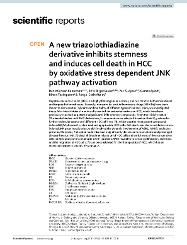| dc.contributor.author | Kahraman, Deniz Cansen | |
| dc.contributor.author | Guven, Ebru Bilget | |
| dc.contributor.author | Aytac, Peri S. | |
| dc.contributor.author | Aykut, Gamze | |
| dc.contributor.author | Tozkoparan, Birsen | |
| dc.contributor.author | Atalay, Rengul Cetin | |
| dc.date.accessioned | 2023-10-19T15:12:09Z | |
| dc.date.available | 2023-10-19T15:12:09Z | |
| dc.date.issued | 2022 | |
| dc.identifier.issn | 2045-2322 | |
| dc.identifier.uri | https://doi.org/10.1038/s41598-022-17444-0 | |
| dc.identifier.uri | https://hdl.handle.net/20.500.12469/5356 | |
| dc.description.abstract | Hepatocellular carcinoma (HCC) is a highly heterogeneous cancer, and resistant to both conventional and targeted chemotherapy. Recently, nonsteroidal anti-inflammatory drugs (NSAIDs) have been shown to decrease the incidence and mortality of different types of cancers. Here, we investigated the cellular bioactivities of a series of triazolothiadiazine derivatives on HCC, which have been previously reported as potent analgesic/anti-inflammatory compounds. From the initially tested 32 triazolothiadiazine NSAID derivatives, 3 compounds were selected based on their IC50 values for further molecular assays on 9 different HCC cell lines. 7b, which was the most potent compound, induced G2/M phase cell cycle arrest and apoptosis in HCC cells. Cell death was due to oxidative stress-induced JNK protein activation, which involved the dynamic involvement of ASK1, MKK7, and c-Jun proteins. Moreover, 7b treated nude mice had a significantly decreased tumor volume and prolonged disease-free survival. 7b also inhibited the migration of HCC cells and enrichment of liver cancer stem cells (LCSCs) alone or in combination with sorafenib. With its ability to act on proliferation, stemness and the migration of HCC cells, 7b can be considered for the therapeutics of HCC, which has an increased incidence rate of similar to 3% annually. | en_US |
| dc.description.sponsorship | Scientific and Technological Research Council of Turkey [112S030]; Turkish Ministry of Development [2016K121540] | en_US |
| dc.description.sponsorship | This work was supported by The Scientific and Technological Research Council of Turkey Grant no.112S030 and The Turkish Ministry of Development project no.2016K121540. We would like to thank Dr. Aybar Can Acar for his valuable contribution to KanSiL infrastructure grant, and Tugce Oksakli for laboratory technical assistance. | en_US |
| dc.language.iso | eng | en_US |
| dc.publisher | Nature Portfolio | en_US |
| dc.relation.ispartof | Scientific Reports | en_US |
| dc.rights | info:eu-repo/semantics/openAccess | en_US |
| dc.subject | Liver-Cancer Cells | En_Us |
| dc.subject | Hepatocellular-Carcinoma | En_Us |
| dc.subject | Cycle Arrest | En_Us |
| dc.subject | Apoptosis | En_Us |
| dc.subject | Phosphorylation | En_Us |
| dc.subject | Chemotherapy | En_Us |
| dc.subject | Inflammation | En_Us |
| dc.subject | Strategies | En_Us |
| dc.subject | Aromatase | En_Us |
| dc.subject | Progress | En_Us |
| dc.title | A new triazolothiadiazine derivative inhibits stemness and induces cell death in HCC by oxidative stress dependent JNK pathway activation | en_US |
| dc.type | article | en_US |
| dc.authorid | Bilget Güven, Ebru/0000-0001-9734-9679 | |
| dc.authorid | Kahraman, Deniz Cansen/0000-0002-3381-5463 | |
| dc.authorid | Aykut, Zaliha Gamze/0000-0003-2184-8628 | |
| dc.identifier.issue | 1 | en_US |
| dc.identifier.volume | 12 | en_US |
| dc.department | N/A | en_US |
| dc.identifier.wos | WOS:000852630800066 | en_US |
| dc.identifier.doi | 10.1038/s41598-022-17444-0 | en_US |
| dc.identifier.scopus | 2-s2.0-85137537542 | en_US |
| dc.institutionauthor | N/A | |
| dc.relation.publicationcategory | Makale - Uluslararası Hakemli Dergi - Kurum Öğretim Elemanı | en_US |
| dc.authorwosid | Bilget Güven, Ebru/AAI-1629-2019 | |
| dc.authorwosid | Kahraman, Deniz Cansen/O-7515-2017 | |
| dc.identifier.pmid | 36071119 | en_US |
| dc.khas | 20231019-WoS | en_US |
















